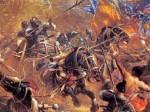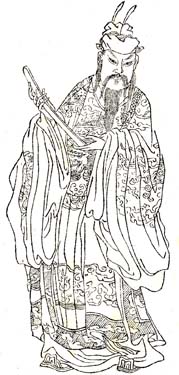Chang-an fell quickly. Problems arose when the spoils of the city promised to the hui ho were denied them. They were asked to continue on with the regular army to Lo-yang. The hui ho qaghan publicly embarrassed the Heir Apparent. In response, the Heir Apparent bribed him handsomely with the spoils of the eastern capital to soothe his feelings. (Here I-ssu might have somehow affected the negotiations, since he acted with them as lieutenant general.)
Three days after the invasion, the loyal troops were on the march toward the eastern capital. On their way out, the army defeated the rebels at what is now Shen-chou; their corpses spread out over thirty li. One hundred thousand heads were collected. During the tenth moon, the imperial armies entered the eastern capital of Lo-yang and took it. Two Chinese divisions, one commanded by Kuo Tzu-i and the other by Li Kuang-pi, struck a frontal attack; the third, made of the hui ho, led by their qaghan, and perhaps assisted by I-ssu, took a roundabout route to surprise the rebels in the rear. The rebel army, led by An Lu-shan’s son (and assassin), came out of the city against Kuo Tzu-i, and did well until the arrows of the hui ho fell on them from the rear and the hui ho themselves, with savage faces and loud, discordant cries, came at them on the run and panicked them, scaring them off. The hui ho were again dissatisfied. They had consented to the booty of Lo-yang instead of Chang-an, but too many who knew the hiding places as well as they had gone before them. Shu, the Heir Apparent, paid them off with one hundred thousand rolls of silk and sent them away with Kuo Tzu-i and I-ssu to battle at Chu-wo.
As he had promised, Su-tsung left Feng-hsiang for the capital on the nineteenth day of the tenth moon and entered the city on the twenty-third day. It is said that when the Emperor returned, great banners rejoiced, hanging rainbow clouds and fluttering phoenix tails, and drums rolled, thunder falling to earth, and for a thousand li the earth displayed no smoke from warning beacons to frighten the people. A few days later, the hui ho chief and his men returned from the east on their way back to the steppes. A feast of farewell was prepared for them in the Diffuse Government Hall, and gifts were promised.
Our ignorance of the details of I-ssu’s life here again produces two possible courses of action for him. After the victory at Lo-yang, he might have either (D) returned to the western capital at Chang-an with the hui ho and accompanied the Emperor in the festivities, or (C) remained with Kuo Tzu-i at the eastern capital at Lo-yang.
(C)
If I-ssu remained with Kuo Tzu-i, these were his circumstances:
From the sixth moon of the first year of Chien-yuan to the seventh moon of the second year, the imperial army assembled in the east under order to wipe out the remainder of the hydra-headed rebel forces. Kuo Tzu-i was appointed, with eight others, to go east. (On the suggestion of a favored eunuch, Su-tsung divided power among the nine leaders in order to keep any one man from becoming too powerful.) At the head of two hundred thousand infantry and cavalry, the nine leaders were sent to assault the main rebel forces in the northern prefecture of Hsian-wei. The patricide son of An Lu-shan, who had come out of Lo-yang against them the year before, had fled there to the city of Yeh.
On the day before the battle, Kuo Tzu-i laid out his formations with three thousand skilled hui ho archers concealed inside a rampart. The next day, on approaching the progressive battle, Kuo Tzu-i signaled his lieutenant to feign flight. When the rebels pursued the retreating wing, the hui ho archers, who lay in hiding, simultaneously let arrows fly from their bows and transfixed their targets. The rebel forces collapsed. General Kuo ordered his forces to envelop the city and make firm their envelopment by building three rings of dirt walls and moats, with watchtowers. Then he brought in water to pour beneath the city walls and made the water level rise and fill the city wells to overflowing. In time, the people within the city began eating one another. A peck of rice brought over seventy thousand in cash. A single rat was valued at several thousand.
After five months, Shih Ssu-ming’s horde came to the aid of the patricide Ching-hsu. They fought the imperial army at their encampment and forced Kuo Tzu-i to retreat. (See Supplement 5) The defeated imperial army raised the siege and fled south. Kuo held his men together, retired across the Yellow River, and severed the Honan Bridge behind him to defend Ku River. By the twelfth moon of 759, Kuo Tzu-i was headquartered in Lo-yang, the Eastern Capital. The Empire’s one large offensive maneuver, led by Kuo Tzu-i, had been an utter fiasco.
Prospects for winning the war diminished as time passed. (See Supplement 6) Early in 756, Kuo Tzu-i’s first northern command came to an end. After the attack of Shih Ssu-ming, and the disaster of a terrible storm, obliged Kuo Tzu-i to raise the siege at Yen-cheng and retire to Lo-yang, the Emperor replaced Kuo Tzu-i. (See Supplement 7) Now their was no unity of command. The spite of a eunuch, one of the imperious government of eunuchs that Su-tsung’s reign had inadvertently created, relieved General Kuo of his duty at the most critical time in the nation’s history, when it seemed that the Dynasty of Tang would give way to the new Dynasty of Yen.
SUPPLEMENTS
Supplement 5:
The Payment of Ssu-ming
 Three days later, the patricide Ching-hsu made a grateful visit to Ssu-ming. Ssu-ming repaid him by strangling him and his four brothers, then withdrew his forces to Fan-yang and assumed the throne of the Greater Yen Dynasty himself.
Three days later, the patricide Ching-hsu made a grateful visit to Ssu-ming. Ssu-ming repaid him by strangling him and his four brothers, then withdrew his forces to Fan-yang and assumed the throne of the Greater Yen Dynasty himself.
Supplement 6:
A Debilitating Government Strategy
 The straightforward command structure established at Ling-wu had fallen apart as danger lessened. The generals did not follow orders from the Emperor’s son, who was an ineffective commander in chief, nor did they cooperate with one another. The government could not inspire them, and hard cash was getting scarce. The Court could not force their soldiers to be brave and resourceful, and civil officials became actively involved in military affairs. Influential eunuchs made matters worse. After 759 government strategy was confined to a static, debilitating defense.
The straightforward command structure established at Ling-wu had fallen apart as danger lessened. The generals did not follow orders from the Emperor’s son, who was an ineffective commander in chief, nor did they cooperate with one another. The government could not inspire them, and hard cash was getting scarce. The Court could not force their soldiers to be brave and resourceful, and civil officials became actively involved in military affairs. Influential eunuchs made matters worse. After 759 government strategy was confined to a static, debilitating defense.
Supplement 7:
A Note on the Death of Ssu-ming
 Later that year rebels again took Lo-yang, and Shih Ssu-ming was killed by his own son with circumstances and excuses remarkably similar to those of the first patricide.
Later that year rebels again took Lo-yang, and Shih Ssu-ming was killed by his own son with circumstances and excuses remarkably similar to those of the first patricide.

